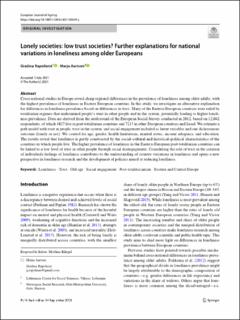Lonely societies: low trust societies? Further explanations for national variations in loneliness among older Europeans
Peer reviewed, Journal article
Published version
Permanent lenke
https://hdl.handle.net/11250/2987306Utgivelsesdato
2021-09-16Metadata
Vis full innførselSamlinger
Originalversjon
https://doi.org/10.1007/s10433-021-00649-zSammendrag
Cross-national studies in Europe reveal sharp regional differences in the prevalence of loneliness among older adults, with the highest prevalence of loneliness in Eastern European countries. In this study, we investigate an alternative explanation for differences in loneliness prevalence based on differences in trust. Many of the Eastern European countries were ruled by totalitarian regimes that undermined people’s trust in other people and in the system, potentially leading to higher loneliness prevalence. Data are derived from the sixth round of the European Social Survey conducted in 2012, based on 12,042 respondents, of which 4827 live in post-totalitarian countries and 7215 in other European countries and Israel. We estimate a path model with trust in people, trust in the system, and social engagement included as latent variables and one dichotomous outcome (lonely or not). We control for age, gender, health limitations, marital status, income adequacy, and education. The results reveal that loneliness is partly constructed by the social–cultural and historical–political characteristics of the countries in which people live. The higher prevalence of loneliness in the Eastern-European post-totalitarian countries can be linked to a low level of trust in other people through social disengagement. Considering the role of trust in the creation of individuals feelings of loneliness contributes to the understanding of country variations in loneliness and opens a new perspective in loneliness research and the development of policies aimed at reducing loneliness.

